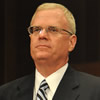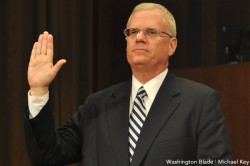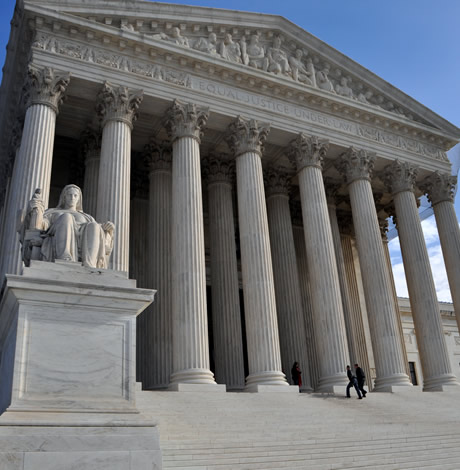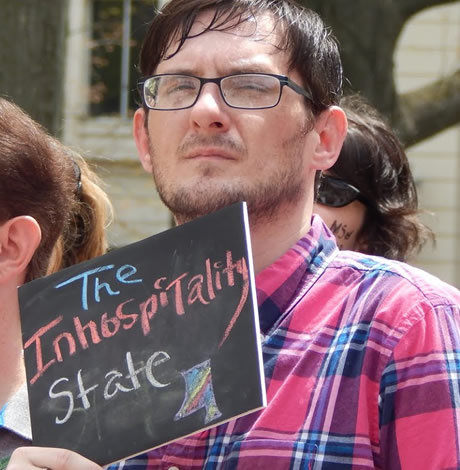National
Senate confirms gay nominee to Calif. federal court
Fitzgerald approved by vote of 91-6

The Senate on Thursday confirmed to the bench a gay judicial nominee whom Republicans had held up for four months from receiving a floor vote along with other appointees.
Michael Fitzgerald, whom President Obama nominated for a seat on the U.S. District Court for the Central District of California in July, was approved by a vote of 91-6. A simple majority was required for confirmation.
The six senators who voted “no” were Roy Blunt (R-Mo.), Jim DeMint (R-S.C.), James Inhofe (R-Okla.), Mike Lee (R-Utah), Rand Paul (R-Ky.) and David Vitter (R-La.). Not voting were Sens. Lamar Alexander (R-Tenn.) and Orrin Hatch (R-Utah) as well as Mark Kirk (R-Ill.), who’s been recovering from a stroke.
“I am honored by the Senate’s confirmation vote today,” Fitzgerald said in a statement. “I am grateful to the President for my nomination. I am grateful to Senator Boxer for her recommendation of me to the President. I am grateful to Senator Feinstein for her support in the Senate Judiciary Committee. I look forward to serving the people of the Central District of California.”
The Senate Judiciary Committee reported out his nomination in November unanimously by voice vote to the Senate floor, but his confirmation has been held up along with other nominees.
Barbara Boxer (D-Calif.), who recommended the Fitzgerald nomination, spoke highly of him on the Senate floor prior to the vote as she chided Republicans for holding up his confirmation.
“He is an historic choice, and a vote of Mr. Fitzgerald’s nomination is long overdue, because he was voted out of the Senate Judiciary Committee unanimously 133 days ago, on Nov. 3, 2011,” Boxer said. “It really shouldn’t take this long to confirm such a highly-qualified nominee like Mr. Fitzgerald, especially because this seat has been designated a judicial emergency.”
According to Boxer’s office, former President George W. Bush’s district court nominees waited an average of 22 days as of March 2004 for confirmation after being reported out by the Judiciary Committee. Comparatively, President Obama’s district court nominees have waited an average of 93 days. Fitzgerald has waited 132 days for a vote on his nomination.
Fitzgerald was among 17 nominees pending before the Senate on which Senate Majority Leader Harry Reid (D-Nev.) filed cloture Monday as a result of Republicans objecting to floor votes on their confirmation. But as a result of a deal that was reached on Wednesday, Democrats and Republicans will move 12 district court judges and two circuit court judges through the confirmation process by May 7. Fitzgerald’s vote was locked in Thursday under the agreement.
LGBT advocates praised the confirmation of Fitzgerald and said his previous work over the years as an attorney makes him qualified for the position on the bench. Fitzgerald has had experience in private practice in addition to working as a U.S. attorney.
Chuck Wolfe, CEO of the Gay & Lesbian Victory Fund, said Fitzgerald’s legal experience “makes him an excellent choice for the federal bench.”
“He joins a still very small but growing group of openly LGBT federal judges, and we commend the Obama administration for making sure these esteemed positions are open to all qualified Americans, regardless of sexual orientation or gender identity,” Wolfe said.
Joe Solmonese, president of the Human Rights Campaign, said he applauds for the Senate for the confirming Fitzgerald — calling him “eminently qualified nominee” — as he took a jab at Republicans for holding up the nomination for so long.
“We are disappointed that it took months for the Senate to consider his nomination because Republican leadership has been refusing to give President Obama’s judicial nominees a timely up or down vote,” Solmonese said.
Michael Fleming, executive director of the David Bohnett Foundation and longtime friend of Fitzgerald’s, also had good things to say about the new judge upon his confirmation.
“I’ve known Michael for years and no one better embodies the qualities we seek to find in all of our judges — wisdom, honesty and integrity,” Fleming said. “There’s a reason why he was nominated by the president and why he has sailed through this process with such ease — because he has the skills and strengths to be a great judge.”
Lorri Jean, CEO of L.A. Gay & Lesbian Center, also said she’s known Fitzgerald for many years and believes he’ll serve the country with honor.
“I’m grateful to the President and the Senate for appointing a judge who brings to the bench not only a keen intellect, a wealth of legal experience and strong ethics, but life experience as a gay man,” Jean said. “It’s essential to have sexual orientation and gender identity diversity on the bench for the same reason it’s important to have racial and gender diversity in the judiciary; the life experience of judges provides valuable insight, and influences, their interpretation of the law. As Supreme Court Justice Sonia Sotomayor once said, ‘Personal experiences affect the facts that judges choose to see.’”
Congratulations also came from the White House.
“The president welcomes the confirmation of Michael Fitzgerald,” said White House spokesperson Shin Inouye. “He will serve the American people well on the U.S. District Court for the Central District of California.”
Fitzgerald was given a review by the American Bar Association, which gave him a rating of “unanimously well-qualified.”
Most recently, Fitzgerald worked at Corbin, Fitzgerald & Athey LLP in 1998, but prior to that experience, he worked at the Law Offices of Robert L. Corbin PC and at the law firm of Heller, Ehrman, White & McAuliffe.
The new judge also served as an assistant U.S. Attorney in Los Angeles, where he handled criminal cases, such as a drug and money laundering case involving what at that time was the second-largest cocaine seizure in California.
In his questionnaire response to the Senate Judiciary Committee, Fitzgerald wrote that he has participated in some LGNT activism, including the 2008 campaign against Proposition 8 as a door-knocker. Fitzgerald is also a member of the Harvard-Radcliffe Gay & Lesbian Caucus. From 2007 to 2008, he served on the leadership task force for the L.A. Gay & Lesbian Center. In the 1990s, he was a member of the Stonewall Democratic Club.
Fitzgerald isn’t a stranger to represent client in cases related to LGBT rights. He was involved in the settlement of Buttino v. FBI, the 1993 class-action lawsuit involving Frank Buttino, a gay FBI specialist who was anonymously outed to his superior, resulting in the removal of his security clearance and subsequent firing. Fitzgerald asked his law firm at the time to represent Buttino on a pro bono basis.
As a result of the settlement, the FBI renounced its prior policy of viewing homosexuality as a negative factor in regard to security clearances, the FBI agreed to hire an openly lesbian special agent and Buttino’s pension was restored.
Fitzgerald is the fourth out federal judicial nominee chosen by the White House, but third one to receive confirmation from the Senate. Fitzgerald’s confirmation makes him the first openly gay federal judge to serve in California.
In July, the Senate confirmed J. Paul Oetken to the U.S. District Court of Southern District of New York, making him the first openly gay male to sit on the federal judiciary. In October, the Senate confirmed lesbian Alison Nathan to the same court.
Another one of Obama’s gay judicial nominees, Edmund DuMont, was withdrawn after he asked the White House to remove him from consideration. DuMont was first nominated on April 14, 2010, but his nomination languished for more than 18 months without the taking Senate taking action. He was nominated the U S. Court of Appeals for the Federal Circuit and would have been the first openly gay federal appellate judge.
The White House
Four states to ignore new Title IX rules protecting transgender students
Biden administration last Friday released final regulations

BY ERIN REED | Last Friday, the Biden administration released its final Title IX rules, which include protections for LGBTQ students by clarifying that Title IX forbids discrimination based on sexual orientation and gender identity.
The rule change could have a significant impact as it would supersede bathroom bans and other discriminatory policies that have become increasingly common in Republican states within the U.S.
As of Thursday morning, however, officials in at least four states — Oklahoma, Louisiana, Florida, and South Carolina — have directed schools to ignore the regulations, potentially setting up a federal showdown that may ultimately end up in a protracted court battle in the lead-up to the 2024 elections.
Louisiana State Superintendent of Education Cade Brumley was the first to respond, decrying the fact that the new Title IX regulations could block teachers and other students from exercising what has been dubbed by some a “right to bully” transgender students by using their old names and pronouns intentionally.
Asserting that Title IX law does not protect trans and queer students, Brumley states that schools “should not alter policies or procedures at this time.” Critically, several courts have ruled that trans and queer students are protected by Title IX, including the 4th U.S. Circuit Court of Appeals in a recent case in West Virginia.
In South Carolina, Schools Supt. Ellen Weaver wrote in a letter that providing protections for trans and LGBTQ students under Title IX “would rescind 50 years of progress and equality of opportunity by putting girls and women at a disadvantage in the educational arena,” apparently leaving trans kids out of her definition of those who deserve progress and equality of opportunity.
She then directed schools to ignore the new directive while waiting for court challenges. While South Carolina does not have a bathroom ban or statewide “Don’t Say Gay or Trans” law, such bills continue to be proposed in the state.
Responding to the South Carolina letter, Chase Glenn of Alliance For Full Acceptance stated, “While Supt. Weaver may not personally support the rights of LGBTQ+ students, she has the responsibility as the top school leader in our state to ensure that all students have equal rights and protections, and a safe place to learn and be themselves. The flagrant disregard shown for the Title IX rule tells me that our superintendent unfortunately does not have the best interests of all students in mind.”
Florida Education Commissioner Manny Diaz also joined in instructing schools not to implement Title IX regulations. In a letter issued to area schools, Diaz stated that the new Title IX regulations were tantamount to “gaslighting the country into believing that biological sex no longer has any meaning.”
Governor Ron DeSantis approved of the letter and stated that Florida “will not comply.” Florida has notably been the site of some of the most viciously anti-queer and anti-trans legislation in recent history, including a “Don’t Say Gay or Trans” law that was used to force a trans female teacher to go by “Mr.”
State Education Supt. Ryan Walters of Oklahoma was the latest to echo similar sentiments. Walters has recently appointed the right-wing media figure Chaya Raichik of Libs of TikTok to an advisory role “to improve school safety,” and notably, Raichik has posed proudly with papers accusing her of instigating bomb threats with her incendiary posts about LGBTQ people in classrooms.
The Title IX policies have been universally applauded by large LGBTQ rights organizations in the U.S. Lambda Legal, a key figure in fighting anti-LGBTQ legislation nationwide, said that the regulations “clearly cover LGBTQ+ students, as well as survivors and pregnant and parenting students across race and gender identity.” The Human Rights Campaign also praised the rule, stating, “rule will be life-changing for so many LGBTQ+ youth and help ensure LGBTQ+ students can receive the same educational experience as their peers: Going to dances, safely using the restroom, and writing stories that tell the truth about their own lives.”
The rule is slated to go into effect Aug. 1, pending any legal challenges.
****************************************************************************

Erin Reed is a transgender woman (she/her pronouns) and researcher who tracks anti-LGBTQ+ legislation around the world and helps people become better advocates for their queer family, friends, colleagues, and community. Reed also is a social media consultant and public speaker.
******************************************************************************************
The preceding article was first published at Erin In The Morning and is republished with permission.
Pennsylvania
Malcolm Kenyatta could become the first LGBTQ statewide elected official in Pa.
State lawmaker a prominent Biden-Harris 2024 reelection campaign surrogate

Following his win in the Democratic primary contest on Wednesday, Pennsylvania state Rep. Malcolm Kenyatta, who is running for auditor general, is positioned to potentially become the first openly LGBTQ elected official serving the commonwealth.
In a statement celebrating his victory, LGBTQ+ Victory Fund President Annise Parker said, “Pennsylvanians trust Malcolm Kenyatta to be their watchdog as auditor general because that’s exactly what he’s been as a legislator.”
“LGBTQ+ Victory Fund is all in for Malcolm, because we know he has the experience to win this race and carry on his fight for students, seniors and workers as Pennsylvania’s auditor general,” she said.
Parker added, “LGBTQ+ Americans are severely underrepresented in public office and the numbers are even worse for Black LGBTQ+ representation. I look forward to doing everything I can to mobilize LGBTQ+ Pennsylvanians and our allies to get out and vote for Malcolm this November so we can make history.”
In April 2023, Kenyatta was appointed by the White House to serve as director of the Presidential Advisory Commission on Advancing Educational Equity, Excellence and Economic Opportunity for Black Americans.
He has been an active surrogate in the Biden-Harris 2024 reelection campaign.
The White House
White House debuts action plan targeting pollutants in drinking water
Same-sex couples face higher risk from environmental hazards

Headlining an Earth Day event in Northern Virginia’s Prince William Forest on Monday, President Joe Biden announced the disbursement of $7 billion in new grants for solar projects and warned of his Republican opponent’s plans to roll back the progress his administration has made toward addressing the harms of climate change.
The administration has led more than 500 programs geared toward communities most impacted by health and safety hazards like pollution and extreme weather events.
In a statement to the Washington Blade on Wednesday, Brenda Mallory, chair of the White House Council on Environmental Quality, said, “President Biden is leading the most ambitious climate, conservation, and environmental justice agenda in history — and that means working toward a future where all people can breathe clean air, drink clean water, and live in a healthy community.”
“This Earth Week, the Biden-Harris Administration announced $7 billion in solar energy projects for over 900,000 households in disadvantaged communities while creating hundreds of thousands of clean energy jobs, which are being made more accessible by the American Climate Corps,” she said. “President Biden is delivering on his promise to help protect all communities from the impacts of climate change — including the LGBTQI+ community — and that we leave no community behind as we build an equitable and inclusive clean energy economy for all.”
Recent milestones in the administration’s climate policies include the U.S. Environmental Protection Agency’s issuance on April 10 of legally enforceable standard for detecting and treating drinking water contaminated with polyfluoroalkyl substances.
“This rule sets health safeguards and will require public water systems to monitor and reduce the levels of PFAS in our nation’s drinking water, and notify the public of any exceedances of those levels,” according to a White House fact sheet. “The rule sets drinking water limits for five individual PFAS, including the most frequently found PFOA and PFOS.”
The move is expected to protect 100 million Americans from exposure to the “forever chemicals,” which have been linked to severe health problems including cancers, liver and heart damage, and developmental impacts in children.
An interactive dashboard from the United States Geological Survey shows the concentrations of polyfluoroalkyl substances in tapwater are highest in urban areas with dense populations, including cities like New York and Los Angeles.
During Biden’s tenure, the federal government has launched more than 500 programs that are geared toward investing in the communities most impacted by climate change, whether the harms may arise from chemical pollutants, extreme weather events, or other causes.
New research by the Williams Institute at the UCLA School of Law found that because LGBTQ Americans are likelier to live in coastal areas and densely populated cities, households with same-sex couples are likelier to experience the adverse effects of climate change.
The report notes that previous research, including a study that used “national Census data on same-sex households by census tract combined with data on hazardous air pollutants (HAPs) from the National Air Toxics Assessment” to model “the relationship between same-sex households and risk of cancer and respiratory illness” found “that higher prevalence of same-sex households is associated with higher risks for these diseases.”
“Climate change action plans at federal, state, and local levels, including disaster preparedness, response, and recovery plans, must be inclusive and address the specific needs and vulnerabilities facing LGBT people,” the Williams Institute wrote.
With respect to polyfluoroalkyl substances, the EPA’s adoption of new standards follows other federal actions undertaken during the Biden-Harris administration to protect firefighters and healthcare workers, test for and clean up pollution, and phase out or reduce use of the chemicals in fire suppressants, food packaging, and federal procurement.
-

 District of Columbia3 days ago
District of Columbia3 days agoCatching up with the asexuals and aromantics of D.C.
-

 South America3 days ago
South America3 days agoArgentina government dismisses transgender public sector employees
-

 Maine4 days ago
Maine4 days agoMaine governor signs transgender, abortion sanctuary bill into law
-

 District of Columbia4 days ago
District of Columbia4 days agoBowser budget proposal calls for $5.25 million for 2025 World Pride









